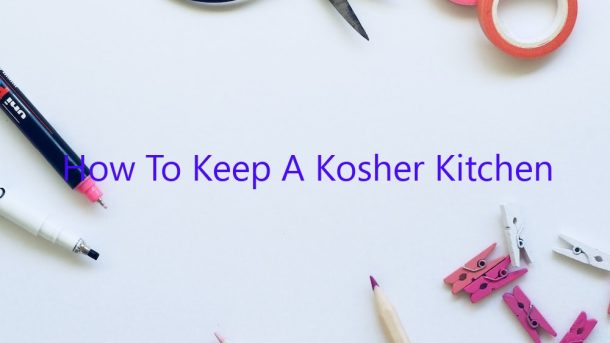If you’re looking to keep a kosher kitchen, you’ll need to be familiar with the rules and regulations that come with keeping a kosher home. Here are some tips to get you started:
1. Make sure all of your utensils are kosher-certified. This means that they have been inspected and approved by a rabbi.
2. Keep a separate set of dishes and utensils for kosher use. This will help avoid any mix-ups.
3. Never cook or eat meat and dairy together. This is one of the most important rules of kosher cooking.
4. Make sure all of your food is kosher. This includes meat, poultry, dairy, and even fruits and vegetables.
5. Learn the kosher symbols and what they mean. This will help you determine whether a food is kosher or not.
6. Get in touch with your local rabbi if you have any questions or concerns. He or she will be able to help you with anything you need.
Keeping a kosher kitchen can be a bit of a challenge, but it’s definitely worth it if you’re looking to observe Jewish dietary laws. With a little bit of preparation and organization, you’ll be able to create a safe and kosher kitchen for your family.
Contents [hide]
What makes a kitchen kosher?
What makes a kitchen kosher?
There are many factors that determine whether a kitchen is kosher. The most important consideration is whether the kitchen is free of any contamination by non-kosher foods. All surfaces and utensils in a kosher kitchen must be free of any traces of non-kosher foods, and kosher ingredients must be used when preparing kosher meals.
In order to make a kitchen kosher, all non-kosher foods and products must be removed from the premises. This includes not only food items, but also cooking utensils, dishes, and appliances. Any items that cannot be removed must be covered and isolated from contact with kosher food.
The oven is a particularly important area to keep kosher, as any traces of non-kosher food can render an entire dish non-kosher. For this reason, many observant Jews will not use an oven that has been used to cook non-kosher food.
There are many other rules and regulations that govern kosher kitchens. For example, meat and dairy products must be kept separate, and dishes and utensils must be washed thoroughly between uses.
If you are interested in making your kitchen kosher, there are many resources available to help you get started. The internet is a great place to start, and there are also many books and articles on the subject. You can also consult with a rabbi or other religious authority to get specific guidance on how to make your kitchen kosher.
How do you keep kosher in a small kitchen?
Keeping kosher in a small kitchen can be a challenge, but it’s not impossible. Here are a few tips to help you out:
1. Make a list of the kosher foods that you can eat and stick to it. This will help you to stay organized and make sure that you’re not running out of options.
2. Plan ahead. If you know that you’re going to be cooking a kosher meal, make sure to start preparing early. This will help to minimize the amount of work that you have to do.
3. Use your freezer and pantry to your advantage. Frozen and canned foods are a great way to make sure that you have a variety of kosher options available to you.
4. Get creative. There are plenty of kosher recipes out there that can be adapted to fit into a small kitchen. Be sure to explore all of your options.
5. Ask for help. If you’re struggling to keep kosher in a small kitchen, don’t be afraid to ask for help from your family and friends. They may be able to give you some useful tips and advice.
What are 5 rules for keeping kosher?
There are many rules that one needs to follow in order to keep kosher, but here are five of the most important ones:
1. kosher foods must not come into contact with non-kosher foods. This means that all surfaces that the food may touch must be kosher, as well as all kitchen utensils and cooking surfaces.
2. kosher animals must be slaughtered in a specific way. They must be fully conscious when they are slaughtered, and the blood must be drained from their bodies.
3. kosher food must be prepared in a kosher kitchen. This means that all surfaces and utensils must be kosher, and no pork or shellfish may be cooked in the kitchen.
4. kosher food must be stored and prepared in a specific way. It cannot be mixed with non-kosher food, and it must be kept separate from non-kosher food.
5. there are certain foods that are not kosher. These include pork and shellfish, as well as meat from animals that have not been slaughtered in the kosher way.
How do you layout a kosher kitchen?
When designing a kosher kitchen, there are some important things to keep in mind. The layout of a kosher kitchen must allow for the separation of dairy and meat products. There must also be a way to keep kosher and non-kosher products separate.
The first step in designing a kosher kitchen is to create a work triangle. The work triangle is a triangular area formed by the refrigerator, the stove, and the sink. This area should be as small as possible, to make cooking and cleaning easier.
The refrigerator and the stove should be placed on opposite sides of the kitchen. This allows for the easy separation of dairy and meat products. The sink should be placed between the refrigerator and the stove, to make washing dishes easier.
In a kosher kitchen, it is important to have separate areas for storing kosher and non-kosher products. The best way to do this is to have two separate cabinets, one for kosher products and one for non-kosher products. This will keep them both organized and easy to access.
A kosher kitchen should also have a separate area for preparing dairy products and a separate area for preparing meat products. This prevents any dairy products from coming into contact with meat products.
Finally, it is important to have a sink that is specifically for kosher dishes. This sink should be used to wash all dishes that have been used in the kosher kitchen. It is important to keep kosher and non-kosher dishes separate, to avoid any contamination.
Why do Jews cover their kitchen in foil?
The practice of covering a Jewish kitchen in foil is one that has been around for many years. Though there are many different explanations for why this tradition began, the most common explanation is that it is a way to keep the kitchen clean.
One of the main reasons why people cover their kitchen in foil is because it helps to keep the counters and appliances clean. When food is cooked, it can produce a lot of spills and messes. By covering the kitchen in foil, it helps to keep these messes from sticking to the surfaces and makes it much easier to clean up.
Another reason why Jews cover their kitchen in foil is because it is believed to be a way to keep the kitchen clean and free of pests. There are many different types of pests that can be found in the kitchen, and by covering the kitchen in foil, it is believed to help keep them away.
Though there are many different reasons why Jews cover their kitchen in foil, the most common explanation is that it is a way to keep the kitchen clean. By covering the kitchen in foil, it helps to keep the surfaces clean and makes it easier to clean up any messes that are created.
Why do kosher kitchens have two sinks?
In kosher kitchens, two sinks are often required in order to meet the dietary laws. One sink is for washing dishes that have come into contact with meat, and one sink is for washing dishes that have come into contact with dairy.
There are a few reasons why this is the case. One reason is that kosher kitchens must have two separate areas for preparing meat and dairy dishes. This is because the dietary laws forbid mixing meat and dairy products. Another reason is that dishes that have come into contact with meat must be washed separately from dishes that have come into contact with dairy, in order to avoid cross-contamination.
Having two sinks in the kitchen is one way of ensuring that these rules are followed correctly. It also makes it easier for cooks to keep track of which dishes have been in contact with meat and which dishes have been in contact with dairy.
Some people might find it surprising that such a seemingly small detail like having two sinks can play such a big role in following the kosher dietary laws. But for those who observe kashrut, the separation of meat and dairy is a crucial part of keeping their kitchen kosher.
Why do Jews not mix milk and meat?
Many people are familiar with the Jewish custom of not mixing milk and meat, but few know the reason behind it. This custom is based on a number of scriptures in the Torah that forbid the consumption of milk and meat together.
The most famous verse is from the book of Exodus, which states, “You shall not cook a young goat in its mother’s milk.” (Exodus 23:19) This verse is interpreted to mean that Jews should not consume any dairy products when meat is also on their plate.
There are a number of reasons why Jews follow this custom. One reason is that milk and meat are two different types of foods. They require different digestive enzymes and processes in the body, and so it is best to consume them separately.
Another reason is that milk and meat are both considered “kosher” foods. In order for a food to be kosher, it must meet a number of dietary restrictions, including being meat or dairy. When milk and meat are consumed together, it creates a “kosher for Passover” food, which does not meet all of the dietary restrictions.
Finally, some rabbis believe that there is a spiritual reason for not mixing milk and meat. They believe that the combination of these two foods creates a state of impurity, and that it is best to avoid it altogether.




